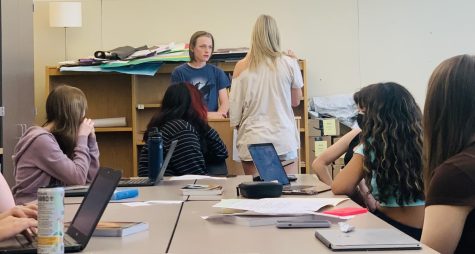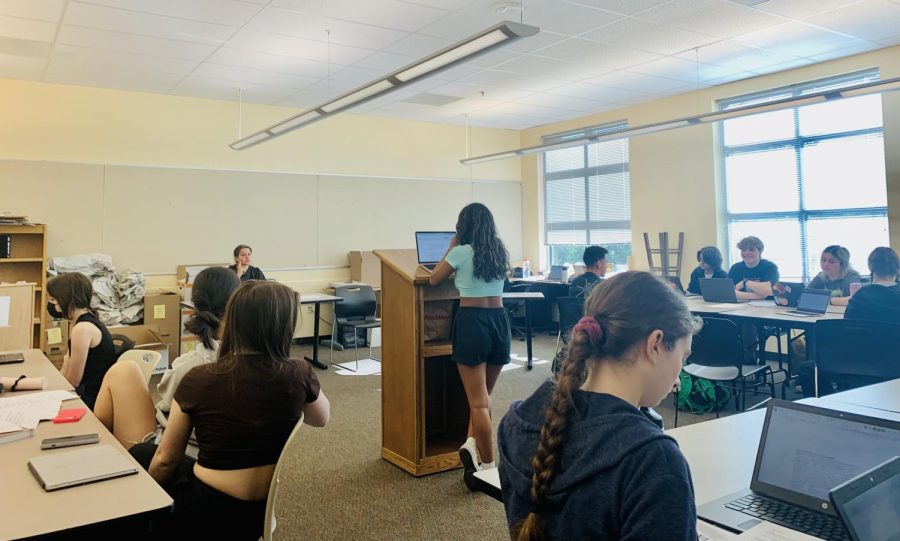A trial from Romeo and Juliet
Ms. Robert’s first-period freshmen English class participates in a Romeo-and-Juliet-themed mock trial. Milan de la Cruz stands at the podium to state her argument for the Capulets. Photo provided by Avery Eckley
Now in session. During the first and fifth periods, Ms. Robert’s class freshman language arts class participated in a mock trial, debating the six deaths in Verona.
While embodying characters from the classic literature script, students portrayed the legendary witnesses as Benvolio, the Nurse, and Friar Lawrence, along with filling the roles of attornies, prosecutors, defendants, a judge, a bailiff, and jury members.
Referring to a case against Lord Capulet and whether Tybalt had acted violently out of self-defense or malice, the students were grouped into parties of Montagues, Capulets, and Outlies.
This experience allowed the students to think critically, prepare, and debate in a positively guided manner. Some students replied when asked about the effort and preparation put into this assignment.
Freshman Andrew Franklin shares, “It took about three days. As a group, we collected lots of evidence, organized our claims, and within a couple of days, each of us wrote out and proofread our individual statements.”
Another perspective came from Freshman Ayoub Laouamri, “I took a long time brainstorming the statement I gave in court, but 100% I loved the process and I think we should have this in more classes. It was a fun way to learn.”
While following accurate, court-based trial procedures, the opposing sides negotiated their different given perspectives on this classic play. The classroom had been thoughtfully rearranged with a centered podium and separate table parties with scripted protocols to mirror a case for justice.
Classmates worked together and supported each other through the preparation and execution of the mock trial. From the detailed explanations and strong claims, the class trial ran smoothly. At one point, a prosecutor forgot his questioning statements, but his tablemate was quick to step up and recover the point.
As a demonstration of understanding, the students incorporated scenes of text evidence to create causes and reasonable doubt in Shakesphere’s initial craft. By the final counterarguments, rebuttals, and closing statements, almost every student had spoken and presented facts to their case.
The discussion had woven through current topics as well and gave opportunities for students to reference present-day fairness and social tensions, and address modern issues such as abuse, secrecy, deceit, murder, etc. Although every student’s contribution was valued and individual to their grade performance, the verdict led to siding with the Capulets.
Students were then asked about the process and how it reflected their understanding of the Shakespeare script. “It was somewhat rather stressful and there was some miscoordination, but through improvisation and collaboration, we were able to demonstrate our learning effectively,” Franklin reflects.
He further explains, “It’s a great example of classic literature, and not always enjoyable, but allows us to dive deep into character tendencies developed and is a good example of a new education style.”
Finally, Andrew Franklin clarified the grading system for this given assignment. Based on a rubric standard, Ms. Roberts graded student performances, dependent on their literary devices, reference to the text, and overall competence.
So many students found this form of learning to be engaging and inclusive. Maybe in the future, this technique of students demonstrating their comprehension can be a larger part of the curriculum.












